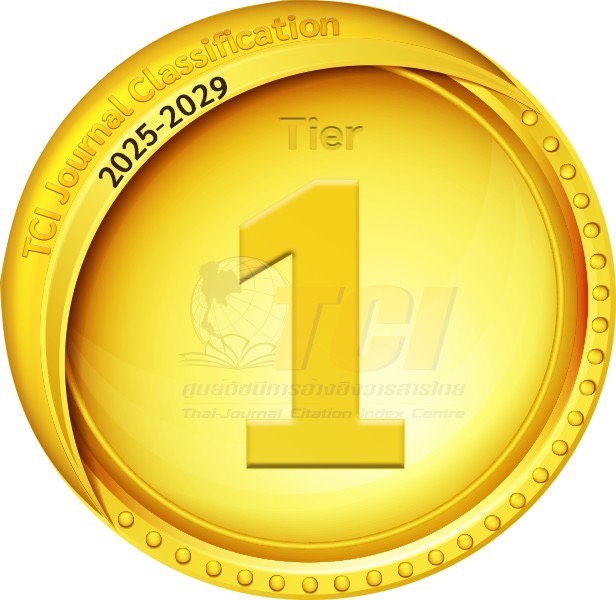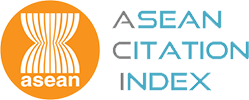Development of the Environmental Science Place-Based Curriculum to Promote Environmental Literacy: A Case Study in Rayong Province
Keywords:
Place–based curriculum, Environmental literacy, Environmental Knowledge, Environmental Ethics, Environmental Cognitive Skills, Rayong provinceAbstract
บทคัดย่อ การวิจัยครั้งนี้มีวัตถุประสงค์เพื่อ 1) พัฒนาหลักสูตรสถานที่เป็นฐาน เรื่อง วิทยาศาสตร์สิ่งแวดล้อม เพื่อส่งเสริมการรู้เรื่องสิ่งแวดล้อม 2) ศึกษาผลของการเรียนรู้โดยใช้หลักสูตรฯ ที่มีต่อการรู้เรื่องสิ่งแวดล้อมด้านความรู้เกี่ยวกับสิ่งแวดล้อม ด้านทักษะทางสติปัญญาทางสิ่งแวดล้อม และด้านจริยธรรมสิ่งแวดล้อม กลุ่มที่ศึกษาคือ นักเรียนชั้นมัธยมศึกษาปีที่ 3 ปีการศึกษา 2560 ประกอบด้วยกลุ่มทดลองและกลุ่มควบคุมอย่างละ 1 ห้อง จำนวน 28 และ 27 คน ตามลำดับ แผนการวิจัยเป็นแบบกึ่งทดลองมีการประเมินการรู้เรื่องสิ่งแวดล้อมก่อน–หลังการวิจัย เครื่องมือที่ใช้ในการวิจัยได้แก่ หลักสูตรสถานที่เป็นฐาน เรื่อง วิทยาศาสตร์สิ่งแวดล้อมและแบบวัดการรู้เรื่องสิ่งแวดล้อม วิเคราะห์ข้อมูลโดยใช้ค่าเฉลี่ย ร้อยละ ส่วนเบี่ยงเบนมาตรฐาน การทดสอบค่าทีแบบเป็นอิสระและไม่เป็นอิสระต่อกัน ผลจากการวิจัย หลักสูตรสถานที่เป็นฐานที่เชื่อมโยงเนื้อหาเข้ากับบริบทของสถานที่ในจังหวัดระยอง และจัดการเรียนรู้ 8 ขั้นสอดคล้องกับหลักการศึกษาโดยใช้สถานที่เป็นฐาน และสามารถพัฒนาการรู้สิ่งแวดล้อมได้ โดยนักเรียนในกลุ่มทดลองร้อยละ 78.6 หลังได้รับการเรียนรู้ในหลักสูตรมีการรู้เรื่องสิ่งแวดล้อมในระดับพอใช้ขึ้นไป มีคะแนนเฉลี่ยการรู้เรื่องสิ่งแวดล้อมภาพรวม ความรู้ทางสิ่งแวดล้อม และทักษะทางสติปัญญาด้านสิ่งแวดล้อมสูงกว่าก่อนเรียนและสูงกว่ากลุ่มควบคุมอย่างมีนัยสำคัญทางสถิติที่ระดับ 0.05 ส่วนด้านจริยธรรมสิ่งแวดล้อม กลุ่มทดลองมีคะแนนเฉลี่ยสูงกว่าก่อนเรียนอย่างมีนัยสำคัญทางสถิติที่ระดับ 0.05 แต่ไม่แตกต่างกับกลุ่มควบคุม คำสำคัญ: หลักสูตรสถานที่เป็นฐาน การรู้เรื่องสิ่งแวดล้อม ความรู้สิ่งแวดล้อม ทักษะทางสติปัญญาด้านสิ่งแวดล้อม จริยธรรมสิ่งแวดล้อม จังหวัดระยอง ABSTRACT The purposes of this research were 1) to develop a place-based environmental science curriculum to promote environmental literacy for the 9th grade students and 2) to study the effectiveness of place-based environmental science curriculum on students’ environmental literacy. The research samples were the 9th grade students who were studying basic science in 2017 academic year from a school in Rayong province. The samples were two classrooms. One classroom was an experimental group (28 students) and the other was a control group (27 students). The research design was a control group pretest–posttest design. Research instruments consisted of place-based environmental science curriculum and environmental literacy test. The data was analyzed by using mean, standard deviation, t–test for dependent sample and t–test for independent sample. The place-based environmental science curriculum is a curriculum that integrated science contents with local context situated in Rayong province. The learning process consisted of 8 steps aligned with the principles of placed-based education. The results indicated that 78.6 percent of the students in an experimental group were at moderate level of environmental literacy and above. The student’s mean score of environmental literacy in overall, environmental knowledge, and environmental cognitive skills after learning with place-based curriculum were significantly higher than before learning and control group (P<0.05). The environmental ethics of students in an experimental group after learning was higher than before learning, but not significantly different (P>0.05) compared with control group. Keywords: Place–based curriculum, Environmental literacy, Environmental Knowledge, Environmental Ethics, Environmental Cognitive Skills, Rayong provinceDownloads
Download data is not yet available.
Downloads
How to Cite
Longsiri, T., Vanitchung, S., Boonprakob, M., & Dahsah, C. (2018). Development of the Environmental Science Place-Based Curriculum to Promote Environmental Literacy: A Case Study in Rayong Province. Science Essence Journal, 34(2), 221–234. Retrieved from https://ejournals.swu.ac.th/index.php/sej/article/view/10717
Issue
Section
Research Article








